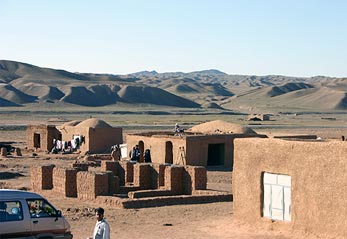More security needed to sustain Afghan returns, says Lubbers
More security needed to sustain Afghan returns, says Lubbers

BERLIN, April 1 (UNHCR) - UN refugee agency chief Ruud Lubbers has called for improved security and the expanded deployment of international forces to stabilise Afghanistan as key elements of refugee return and reconstruction in the country.
Addressing governments gathered in Berlin on Thursday for an international meeting on Afghanistan's reconstruction, High Commissioner Lubbers hailed the return of more than 3 million Afghans in the last two years as a sign of confidence in the Kabul government. This year alone, more than 65,000 Afghan refugees have gone home from Iran and Pakistan to rebuild their war-torn homeland.
However, stressed Lubbers, security is crucial in maintaining the flow of returns. "Refugees always ask us if there is a trained police force or international military presence in their home areas," he said. "Understandably, this is a major concern for them. It is also necessary for the United Nations and its humanitarian partners."
The High Commissioner called for a rapid expansion of the NATO-led International Security and Assistance Force and the country's police to ensure a minimum level of security in Afghanistan. More stability in the country's north-east, centre and west will enable UNHCR to start actively encouraging returns to some areas. Currently, the refugee agency only facilitates the repatriation of Afghans who have already decided to go back on their own.
The return of minority groups, in particular, is important for fostering co-existence and peace-building in Afghanistan. Lubbers told officials that UNHCR welcomed recent commitments by the country's regional leaders to guarantee the safety of minority groups intending to return home. He said that it would be important for displaced Afghans and refugees to go back and vote in the upcoming parliamentary and presidential elections, particularly so minorities would be properly represented in parliament.
UNHCR plans to assist 400,000 Afghan refugees home this year, and to help all of Afghanistan's 180,000 internally displaced persons to go back to their communities by the end of 2005.
Stressing the need for long-term development aid, Lubbers explained that boosting Afghanistan's absorption capacity by meeting infrastructure and reconstruction needs will mean that people going home do not overwhelm areas recovering from decades of war.
"Sustainability is the key here," he said. "Afghanistan must be able to absorb returning refugees, and communities welcoming them back must be better equipped to handle ongoing returns; that means meeting the demand for jobs, education, health care and shelter."
The refugee agency is working with the Ministry of Rural Development to include returnees in the government's nationwide development programme. Projects under the National Solidarity Programme range from building access roads, bridges and culverts to cleaning water channels in the country.
Afghans returning under UNHCR's auspices receive a travel grant upon their return, as well as funds to buy food and other items on the local market. They are also integrated into local assistance programmes, including infrastructure projects like well drilling and schools. The refugee agency has appealed for $122.5 million for Afghanistan and repatriation programmes in surrounding countries this year.
Looking at longer-term regional developments, High Commissioner Lubbers said, "As Afghanistan's relations with its neighbours become more normal, we will need to think not only in terms of all Afghans abroad being refugees, but to think also about ways to regularise migratory movements within the region - whilst ensuring that those who still require international protection receive it."
By regularising the status of non-refugee Afghans who are working or studying in neighbouring countries, he added, commercial and trade links can be improved to promote economic growth and stability in the region.








